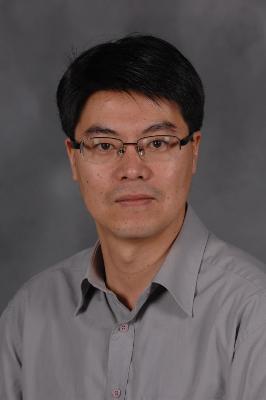May 21 2015
The National Institutes of Health (NIH) has awarded Kent State University's Min-Ho Kim, Ph.D., assistant professor of biological sciences in the College of Arts and Sciences, a $1,842,350 five-year grant. The grant from the NIH's National Institute of Nursing Research is to develop "nanobombs," a nanotechnology-based therapeutic platform that can treat biofilm infection in chronic wounds.
 Min-Ho Kim, Ph.D., an assistant professor of biological sciences at Kent State University, has been awarded a five-year grant from the National Institutes of Health to develop a nanotechnology-based therapeutic platform that can treat biofilm infection in chronic wounds. Credit: Kent State University
Min-Ho Kim, Ph.D., an assistant professor of biological sciences at Kent State University, has been awarded a five-year grant from the National Institutes of Health to develop a nanotechnology-based therapeutic platform that can treat biofilm infection in chronic wounds. Credit: Kent State University
Kim will lead a research collaboration with three other research laboratories. Songping Huang, Ph.D., professor of chemistry at Kent State, will be responsible for the synthesis of functionalized magnetic nanoparticles to be used in the project. Scott Simon, Ph.D., a biomedical engineering professor at the University of California, Davis, will evaluate the potential impact of engineered nanoparticles on host innate immunity. Jose Renau, Ph.D., an associate professor of computer engineering at the University of California, Santa Cruz, will develop and implement tissue temperature monitoring and a feedback control system to ensure the safe application of the thermotherapy system.
The researchers hope the "nanobombs" will provide a needed tool for the treatment of fragile patients who cannot be successfully treated with standard antibiotic treatments.
"With a clear, present need for an effective antimicrobial therapy for wound infections, we hope to establish a novel platform for 'smart' treatments for the management of antibiotic-resistant chronic wound infections," Kim said.
Acute infections, lasting only a few days, are generally treatable with antibiotics. However, in cases where the bacteria forms a biofilm within the human host, which occurs quite often in chronic wounds including diabetic ulcers or venous ulcers, the acute infection develops into a chronic state and it becomes very difficult to treat.
A critical challenge is that biofilm infections are resistant to conventional antibiotics or antimicrobial agents and readily evade innate immune attack.
The "nanobombs" are made of magnetic nanoparticles that are surface-coated with molecules that can specifically recognize bacteria and are controlled by a remotely applied magnetic field.
"To target, we use an exact intensity of the magnetic field which triggers only the 'nanobombs' to absorb significant amounts of magnetic energy," Kim said. "The energy, which can be converted into heat, explodes to kill bacteria while leaving the remaining other normal and healthy tissue intact. The nanobomb treatments would be minimally invasive, resulting in fast recovery times and fewer side effects."
During the next five years, the study will be focused on validating the therapeutic efficacy of the technology using preclinical animal models of diabetic wound infection and further optimizing the system to ensure safe application.
"This study also will produce valuable information on the impact of the use of engineered nanoparticles in nanomedicine," Kim said. "Recently, there has been a lot of interest in the use of engineered nanoparticles in diagnosis and therapeutics, but there also have been concerns over the potential health impacts of engineered nanoparticle. Surprisingly, limited knowledge exists about how engineered nanoparticles interact with host cells and the subsequent biological pathways that are impacted. This study will address those concerns as well."